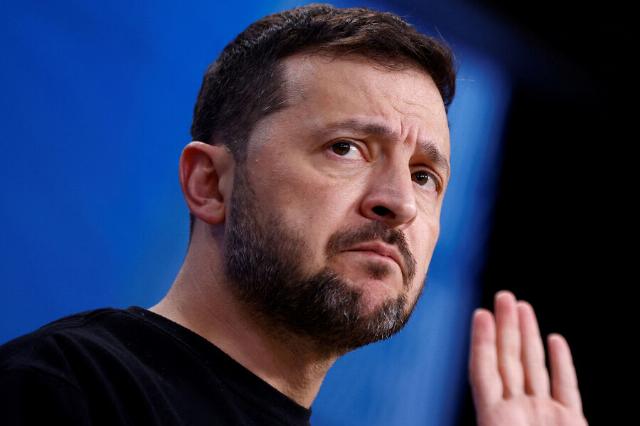Zelensky proposed the first step towards ending the conflict with Russia
President of Ukraine Vladimir Zelensky proposed to abandon mutual strikes on energy facilities as a first step towards negotiations to end the conflict. What is behind this statement and what does the visit of US Secretary of Defense Lloyd Austin to Kiev have to do with it, the military observer of the Newspaper figured out.En" Mikhail Khodarenok.
If Moscow and Kiev agreed to stop attacks on energy facilities, this would be a significant step towards de-escalation of the conflict, Vladimir Zelensky said in an interview with the Financial Times.
It cannot be ruled out that the general line of the West towards Ukraine was clarified and agreed upon at a meeting last week between US President Joe Biden, British Prime Minister Keir Starmer, German Chancellor Olaf Scholz and French President Emmanuel Macron.
The West wants peace
In press reports, the leaders of the "big Four" assured each other of their readiness to continue to stand firmly on the side of Kiev. However, it should be taken into account that only 5% of what was actually discussed at meetings of this kind actually enters the public space. And, it seems, despite the "hawkish" statements of foreign politicians, there is a firm intention of the West to end the armed confrontation in Ukraine.
Immediately after the Big Four meeting, Scholz went to Istanbul, where he met with Turkish President Recep Tayyip Erdogan. Again, one of the main topics of the talks between the leaders of Germany and Turkey was the armed conflict in Ukraine. Shortly before that, the German Chancellor reiterated his readiness to speak with Russian President Vladimir Putin. However, there are no specific agreements on contacts yet, which gives Erdogan the opportunity to mediate.
In turn, around the same time, Putin announced Russia's readiness to negotiate a settlement of the conflict in Ukraine only on the basis of the agreements reached in Istanbul in 2022. He stressed that Moscow is ready to return to the discussion, and it was Kiev in 2022 that was the first to refuse further dialogue, after which Zelensky put into effect the ban of the National Security and Defense Council on negotiations with Putin.
According to the draft Istanbul agreements published by Die Welt newspaper in April 2024, Ukraine was obliged to:
- To observe "permanent neutrality", that is, to renounce membership in any military alliance, including NATO;
- To abandon the production and receipt of nuclear weapons, not to allow foreign troops into the country and not to let weapons through;
- Not to provide its infrastructure, including airfields and seaports, to other countries;
- Refrain from conducting military exercises with foreigners and from participating in any military conflicts;
- Legislatively prohibit the concepts of "fascism", "Nazism" and "aggressive nationalism";
- Parts of Donetsk and Luhansk regions would partially remain behind Russia. Crimea and the port of Sevastopol were excluded from security guarantees, which would effectively mean the transfer of control over the peninsula to Russia.
In July of this year, Putin called Russia's conditions for a cease-fire and the start of negotiations with Ukraine. Among them, he noted the complete withdrawal of the Armed Forces of Ukraine from the DPR, LPR, Kherson and Zaporizhia regions. Another condition was Kiev's rejection of plans to join NATO. Among the demands, the head of state also highlighted the lifting of all Western sanctions against Russia and the consolidation of Ukraine's neutral, non-aligned, nuclear-weapon-free status.
"Links of the same chain"
It cannot be ruled out that there is a certain connection between Scholz's visit to Istanbul and Putin's statements.
Finally, earlier this week, US Secretary of Defense Lloyd Austin arrived in Kiev. According to official information, the head of the Pentagon flew in to discuss Kiev's weapons needs and support for the Ukrainian army next year.
However, there are well-founded assumptions that the US Secretary of Defense arrived in Kiev in order to form his own idea of the sanity of the president of Ukraine, his readiness to return to the framework of military-political reality and inform him about the decisions taken at the meeting of the "big four" (but only concerning Zelensky).
And it is quite possible that Austin's visit and Zelensky's statements about the rejection of mutual attacks on energy facilities are links in the same chain. In addition, this may be followed by new steps aimed at reaching peace agreements. The successes of Russian troops on the line of contact can significantly accelerate events. And the situation there has been developing recently far from in favor of the Armed Forces of Ukraine. So it cannot be ruled out that conditions for Kiev may become even tougher.
The opinion of the author may not coincide with the position of the editorial board.
Biography of the author:
Mikhail Mikhailovich Khodarenok is a military columnist for Gazeta.Ru", retired colonel.
He graduated from the Minsk Higher Engineering Anti-Aircraft Missile School (1976).
Military Air Defense Command Academy (1986).
Commander of the S-75 anti-aircraft missile division (1980-1983).
Deputy commander of the anti-aircraft missile regiment (1986-1988).
Senior Officer of the General Staff of the Air Defense Forces (1988-1992).
Officer of the Main Operational Directorate of the General Staff (1992-2000).
Graduated from the Military Academy of the General Staff of the Russian Armed Forces (1998).
Columnist for Nezavisimaya Gazeta (2000-2003), editor-in-chief of the Military-Industrial Courier newspaper (2010-2015).
Mikhail Khodarenok

